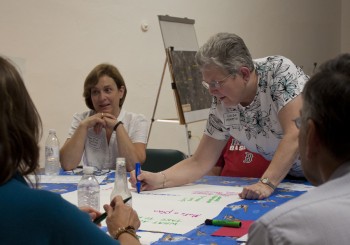Issue
Building resilience to storms, climate change, and local vulnerabilities is important to rebounding quickly from hazard events and preparing for long-term changes. Engaging communities to support these changes is critical to their success. The New Hampshire Coastal Adaptation Workgroup is a coalition of 16 organizations that represent all sectors of government, the private sector, and nonprofits working to improve the resilience of New Hampshire communities and resources to storms and the effects of climate change, including sea level rise.
Process
The workgroup used the process outlined in the NOAA Office for Coastal Management’s Roadmap for Adapting to Coastal Risk as the foundation for its vulnerability assessment efforts with New Hampshire communities. New Hampshire Sea Grant and Cooperative Extension joined with the workgroup to design a vulnerability assessment process with the Town of Newfields using the Roadmap. In total, more than 100 community members participated in one of three community conversations about the impacts of storms and climate change, local vulnerabilities, and opportunities for building resilience in their community.
Impact
The local planning board and emergency manager used the results of the community conversations to develop an action plan that includes new stormwater regulations, demonstration projects to build public awareness, and emergency preparedness education efforts. The workgroup is planning a second round of conversations with a neighboring community to encourage multi-community approaches to building resilience.

